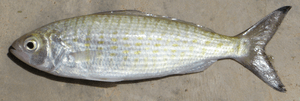Microcotyle arripis facts for kids
Quick facts for kids Microcotyle arripis |
|
|---|---|
| Scientific classification | |
| Genus: |
Microcotyle
|
| Species: |
arripis
|
Microcotyle arripis is a species of monogenean, parasitic on the gills of a marine fish. It belongs to the family Microcotylidae.
Systematics
Microcotyle arripis was first described by Sandars in 1945 based on 51 specimens from the gills of the Australian herring Arripis georgianus (Arripidae) off Western Australia. It was redescribed and illustrated from the type host and locality,. All authors noted minor differences in their redescriptions.
A sequence of the species' 28S rRNA gene has been published.
Description
Microcotyle arripis has the general morphology of all species of Microcotyle, with a symmetrical elongated body tapered posteriorly and anteriorly, comprising an anterior part which contains most organs and a posterior part called the haptor. The haptor is symmetrical, not well delimited from body proper and bears 35 pairs of clamps, arranged as two rows, one on each side. The clamps of the haptor attach the animal to the gill of the fish. There are also two buccal suckers at the anterior extremity. The digestive organs include an anterior, terminal mouth, a circular muscular pharynx situated very close to the oral suckers, an oesophagus bifurcating a little distance behind the genital atrium and a posterior intestine with two lateral branches that penetrates the haptor and are provided with numerous secondary branches. Each adult contains male and female reproductive organs.
Diagnosis
According to Sandars (1945), Microcotyle arripis most closely resembles Microcotyle caudata, Microcotyle truncata, Microcotyle fusiformis, and Microcotyle sebastis. It can be distinguished from these species by different measurements.
Hosts and localities

The type-host is the Australian herring Arripis georgianus (Arripidae). The type-locality is off Western Australia. There are other records.

